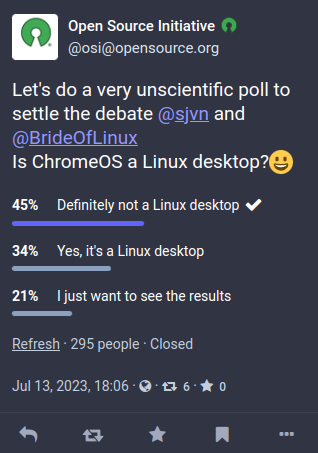An article in which we ponder desktop Linux’s rising usage numbers, and debate ChromeOS’s status as a Linux operating system.

Ireland-based Statcounter says that in February desktop use of Linux, compared to other operating systems, rose to more than 4%, which is a milestone for the operating system that dominates all aspects of computing except the desktop. Statcounter is a web traffic analysis website that’s free to use, but which also offers advanced paid services to websites.
Four percent (actually 4.03%) means that we penguinistas are still vastly outnumbered by Windows and MacOS users of course, which hold 42.13% and 15.46% of user share respectively. We’re even a couple of points below the 6.1% showing by “other,” which I’m guessing are some secret operating system concoctions being used by the Chinese, our NSA, the Russians, or any of the other usual suspects. To offset that, we’re ahead of ChromeOS (wait, isn’t ChromeOS Linux?) by almost a couple of percent, so I guess that’s something.
I’m not about to declare this to be the year of the Linux desktop or anything, mainly because that hasn’t been a thing in so long that to even mention it would brand me as a geezer. Besides, with Microsoft planning on turning Windows into something of a pay-by-the-month software as a service product, what does it matter? Eventually we’ll be top dog (er, penguin), if only because we’ll be the last old fashioned, install-it-on-your-own-hardware operating system still standing.
The good news is not in the 4% number, but the fact that desktop Linux use is on the rise, and according to Statcounter, has been for a while. Last May Linux use was at 2.7%. It passed across the 3% threshold in June (which I noted here) and moved above 4% only eight months later. Considering that for most of the 21st century Linux use has hovered at about 1.5% or lower, that’s impressive.
The Chrome Question
Actually, the user share for desktop Linux rises to 6.29% if we consider Google’s ChromeOS to be Linux. Many think it should, since it runs on the Linux kernel and you can install Linux apps from the command line on it using apt-get, just like you do on any real Linux distribution (GNU/Linux, if you must) that uses apt-get as its package manager. Deb files can also be downloaded and installed from a user interface, just as they can in many Linux distros. Snaps, Flatpaks, and Appimages will also run on modern versions of ChromeOS.
Considering the fact that Chrome runs atop the Linux kernel, and can run the same apps natively as other Linuxes, it’s hard to make the case against it being considered a part of the Linux family. However, there’s no denying that it’s quite a different operating system than traditional Linuxes when you look under the hood. Remember, initially ChromeOS wasn’t capable of running Linux apps, not until the addition of Crostini, Google’s umbrella term for the software layer that makes Linux application support available in ChromeOS.

I’m sorta on the fence on this one, but then again I’m not. Even though ChromeOS would seem to qualify as a Linux operating system under the walks-and-quacks-like-a-penguin rule (do penguins quack?), I’m inclined to give it a thumbs-down and relegate it to some sort of hybrid GNU/Linux-like category (see how handy the term “GNU/Linux” can be when you need it?).







It is as much Linux as is Android, no?
“GNU/Linux-like” reminds me of the days of Unix and Unix-like. When it came to Unix there were two main code bases, AT&T Unix, with a release number of 5.x, and Berkeley Software Distribution “Unix”. Of course most of the different system vendors had off-shoots of those (SunOS, Solaris, HP/UX, Ultrix, DEC OSF/1, AIX, etc.) as their brand names, and I often had customers (and even DEC sales people) say to me that they wanted “UNIX” so I would patiently say to them that what they had *was* Unix, but DEC’s brand of Unix.
Then when the trademark of Unix was separated from the code base and attached to a set of test suites, this gave all the vendors the chance to have their offerings branded as Unix by passing the tests and paying their money.
All other distributions were delegated to being “Unix-like”.
It is great news that Linux Desktop share is increasing. 🙂
It could be be the Chinese!
According to a recent article in the Financial Times, an edict was given out last December – xinchuang – which instructed the military, government, state sectors and state owned enterprises to migrate to “homemade” hardware and software : Kylin, Unity or Fangde (whatever that is!)
That would encompass a lot of PCs… So it could be the Year of the Linux Desktop!
https://www.ft.com/content/7bf0f79b-dea7-49fa-8253-f678d5acd64a